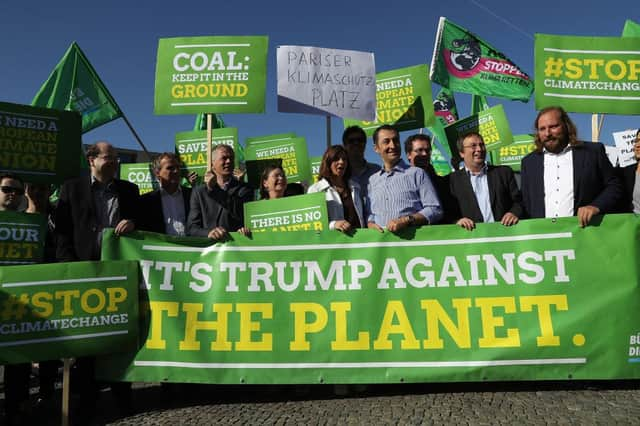Paris Agreement: what is the climate accord - and why Joe Biden has rejoined on first day as president


In one of his first actions as US president Joe Biden has rejoined the Paris climate accord.
The action has been welcomed by world leaders, with UK prime minister Boris Johnson describing the move as “hugely positive”.
Advertisement
Hide AdAdvertisement
Hide AdThe US formally left the Paris accord on the day after the presidential election in November, the only nation ever to do so, in a move instigated by former president Donald Trump, who pursued environmentally damaging policies while in office.
What is the Paris Agreement?
The Paris Agreement is a legally binding international treaty on climate change signed by 196 parties at the United Nations Climate Change Conference, or COP 21, in 2015.
The deal commits countries to curb global warming to 2C above pre-industrial levels and aims for a more stringent 1.5C limit to avoid the worst climate impacts – which require pollution to be cut to net zero within a few decades.
Without rapid and stringent action on greenhouse gases, the world faces worsening storms, floods, droughts, sea level rises, reductions in crop yields, wildfires and wildlife loss.
The world remains well off-track to meet the accord’s goals, and countries are expected to bring forward new, more ambitious climate plans ahead of the UN COP 26 summit being hosted by the UK in Glasgow in November.
Which countries haven’t ratified the Paris Agreement?
As of January 2021 195 countries have signed the Paris Agreement, while two have ratified the agreement without signing.
Seven countries are still to ratify the agreement – these are: Iran, Turkey, Iraq, Eritrea, Libya, South Sudan and Yemen.
Why is the deal important?
Under the Paris Agreement, each country must determine, plan and regularly report on the contribution that it undertakes to mitigate global warming.
Advertisement
Hide AdAdvertisement
Hide AdThe agreement doesn’t force any particular country to set a specific emissions target by a specific date, but any targets set out by countries under the agreement must go beyond previously set objectives.
Scientists have warned failure to curb dangerous climate change will lead to sea level rises, more intense storms and flooding, more extreme droughts, water shortages and heatwaves as well as massive loss of wildlife and reduction in crop yields, potentially sparking conflict and mass migration.
Before the announcement, national leaders, the pope and the UN secretary general were among those who had warned of the importance of climate action, and environmental and aid campaigners reacted angrily to news of the US withdrawal.
What now for US in fight against climate change?
Mr Biden has pledged to ensure the US reaches net-zero emissions by 2050, and as part of the return to the Paris Agreement, his administration must submit a new national action plan on how it will curb pollution this decade.
Countries such as China – which has pledged to become carbon neutral by 2060 but has not yet put forward its national plan – will be watching closely to see what action Mr Biden drives forward in the coming months.
During the election campaign, Mr Biden pledged 2 trillion dollars over four years as part of efforts to push towards 100% clean electricity by 2035, drive take up of zero-emissions vehicles and making buildings more efficient, as well as a diplomatic push on climate action.
With wins in two Senate races in the state of Georgia earlier this month, the Democrats now have a slim majority in the Senate which will make it easier to pass funding for climate action.